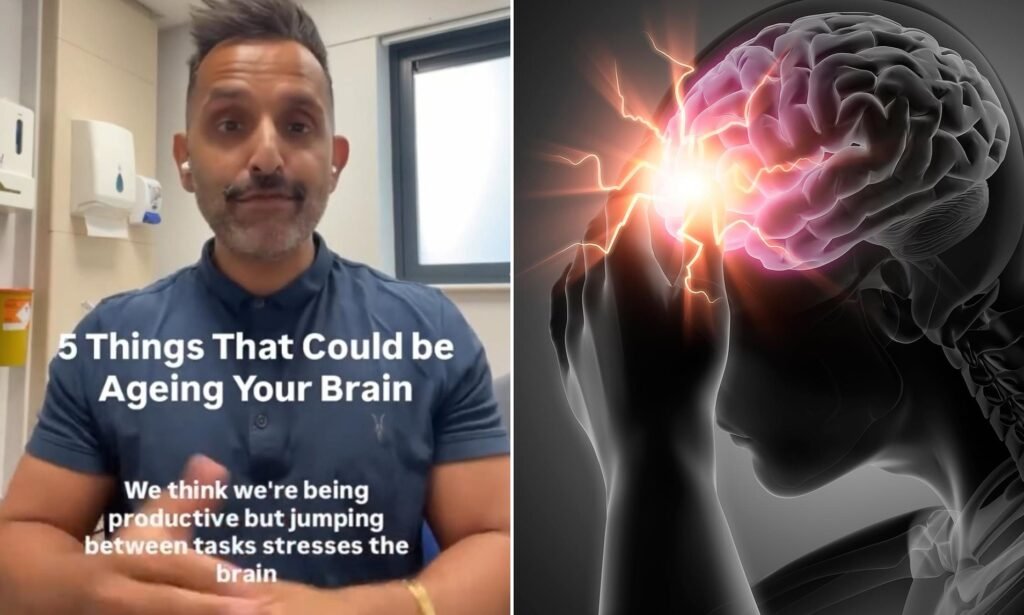The Hidden Dangers of Multitasking and Other Habits Affecting Brain Health
In today’s fast-paced world, the ability to juggle multiple tasks at once is often seen as a sign of productivity. However, recent research suggests that this habit might be doing more harm than good to our brain health. A leading general practitioner has raised concerns about the negative effects of constant multitasking, highlighting how it can stress the brain and lead to long-term cognitive decline.
Dr. Amir Khan, in a popular TikTok video, outlined five everyday habits that could be aging the brain. The first on his list was constant multitasking. He explained that while many people believe they are being productive by switching between tasks, this behavior actually places a significant strain on the brain. According to Dr. Khan, multitasking can weaken short-term memory and increase cortisol levels, which over time may affect the brain’s grey matter—responsible for focus and emotional control.
The idea that women are naturally better at multitasking has been around for years, often attributed to their historical roles in managing households and raising children. However, recent studies have shown that men are also capable of handling multiple tasks effectively. Despite this, a survey of 2,000 Britons found that only 2.5% of people could perform two tasks simultaneously without a drop in performance, suggesting that true multitasking is rare.
A social media user questioned whether there is research supporting the idea that multitasking uses different parts of the brain in a positive way. Dr. Jennifer E. Davies, a neuropsychology expert at Brown University, explained that when we multitask, the brain rapidly switches between tasks. While these effects may be temporary, she warned that chronic stress from multitasking can have lasting impacts on the brain, including increased blood pressure and heart rate, as well as symptoms of depression and anxiety.
Studies have also shown that multitasking can lead to short-term memory problems and psychological distress. Researchers found that trying to do multiple tasks at once can cause stress on the heart and impair cognitive function. However, Dr. Davies noted that some forms of multitasking, such as walking on a treadmill while reading a book, are acceptable because one task is fully automated.
Experts have also raised concerns about “media multitasking,” such as texting while watching TV or browsing the internet while listening to music. A study found that using multiple media devices simultaneously can reduce the amount of grey matter in the brain, which is responsible for controlling movement, memory, and emotions. A BT Network Wrapped study revealed that more than a third of Britons regularly split their attention between multiple screens, with Gen Z being the most affected.
In addition to multitasking, Dr. Khan highlighted four other habits that could be detrimental to brain health. Chronic sleep deprivation was identified as the second most harmful habit. Lack of sleep, especially deep sleep, can impact the brain’s lymphatic system, which is responsible for removing waste. This can lead to plaque formation, linked to Alzheimer’s disease.
Doom-scrolling, or spending excessive time on negative news, was listed as the third harmful habit. Neuroscientists found that teens who spend more than two hours doom-scrolling have double the risk of anxiety and quadruple the risk of depression. Dr. Khan explained that passive scrolling can overstimulate the brain, trigger stress responses, and reduce dopamine sensitivity, affecting mood and memory.
Skipping meals, especially breakfast, was another concern. Glucose is the brain’s primary fuel, and skipping meals can lead to reduced concentration and brain fog. Lastly, loneliness was identified as a brain-killer. Social interaction is crucial for cognitive health, with studies showing that loneliness is as harmful to the brain as smoking 15 cigarettes a day. Regular socializing can boost cognitive reserve and reduce the risk of dementia.

